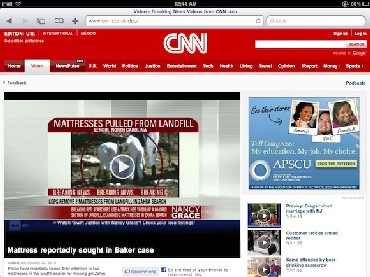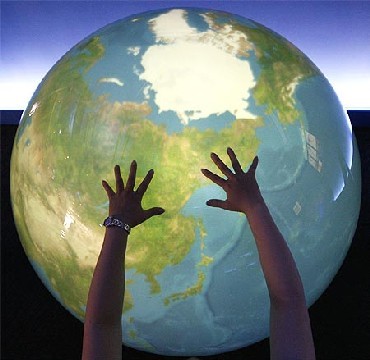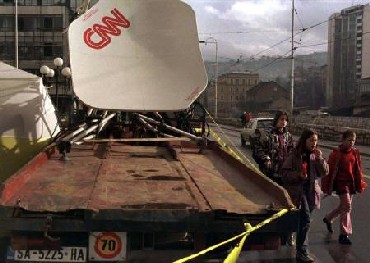Photographs: Reuters Vanita Kohli-Khandekar in New Delhi
CNN is one of the handful of global media brands that have managed to harness the power of the internet. Just like The Guardian, The Economist or BBC, it started by investing time, effort and people into the business as early as the mid-1990s.
Nick Wrenn is the Atlanta-based vice-president of digital services for CNN International.
He is responsible (editorially) for all of CNN's digital assets outside the United States. He talks about the challenges of going digital.
...
How CNN harnesses the power of internet
Does getting content for different media present a challenge at the editorial end (people) or at the technology end?
The challenges we face on the editorial front are not specific to the media platform. One of the biggest challenges this year is getting accurate information and video from places where independent journalists are not welcome.
CNN's newsgathering operation serves all the network's different departments and over the last few years, we've invested heavily in content ownership, including video, text and still pictures.
Our correspondents, producers and camera operators support CNN digital by filing content from the stories they cover, as well as their TV demands.
...
How CNN harnesses the power of internet
Does cross-platform content, especially digital, work better for some genres, say sports and news, than for others?
I wouldn't say that any particular topic is better than another. Regardless of the genre, we need to have quality content.
The news business is extremely competitive with thousands of sites, blogs and social networks offering information and opinion.
As well as the writing, images have become much more important in our story-telling and we have also been working to produce more unique and compelling video content for online and mobile users, including topics that are not necessarily hard news.
...
How CNN harnesses the power of internet
Photographs: Alex Grimm/Reuters
Does digital/cross-platform content become easier to deliver if you have your own news gathering infrastructure like CNN?
Absolutely. I believe that traditional and new media platforms are collaborators, with each complementing the strengths of the other to provide a more holistic experience to consumers/viewers.
CNN pioneered online news in 1995 and the website was re-launched in October 2009. Our content ownership strategy has allowed us to expand the depth and breadth of coverage on cnn.com and across other new media platforms.
For instance, we have recently launched CNN applications for the iPad and iPhone, allowing users to access news anytime, anywhere.
For the first eight weeks after the launch, these apps were ranked number 1 or number 2 among all the available apps in countries across the world.
...
How CNN harnesses the power of internet
Photographs: Danilo Krstanovic/Reuters
This also means that programmes and anchors/correspondents have a strong presence on social networking platforms, including Facebook and Twitter, reaching out to consumers on a variety of platforms.
Twitter and Facebook have also been key in reporting breaking news, whether in the case of natural calamities such as the Japan earthquake and tsunami or social and political upheavals such as those witnessed in Egypt and Libya.
CNN International's user generated online community, iReport, invites audiences to participate in the storytelling.
For instance, post the earthquake in Japan, one of our iReporters in Japan brought our global audiences worldwide perspective on the on-ground situation via Skype.
Have a look at a new concept we've developed called Open Story, which allows us to present a wide range of content about one issue on one page.
In the first 36 hours after the quake and tsunami in Japan, we received more than 700 iReports, which became an integral part of our network's coverage of that appalling story.
...
How CNN harnesses the power of internet
Why does monetisation of digital remain such a challenge? From the CNN experience, how much does digital contribute to top line and bottom line for the brand?
I can't disclose commercial figures, but I can say that CNN's digital businesses are profitable and have been for many years.
Which media brands have done the best job in the digital space according to you?
From a personal perspective, I admire how some newspaper brands have established themselves as strong digital brands through quality reporting and web-friendly presentation, for example the Financial Times, Guardian and the Daily Telegraph.
...
How CNN harnesses the power of internet
Photographs: Jo Yong-Hak/Reuters
Do you see any patterns in the way news is consumed on digital platforms across different markets? How are these different from the way news is consumed on linear TV?
Essentially, a compelling story will be well hit wherever the users are. However, we have seen an especially strong response to our mobile apps from South-East Asia, especially Korea and Singapore.
It's also interesting to look at how social media referrals to our website come largely from North America and the UK, especially from Facebook and Twitter.
There also seems to be a greater appetite to comment on stories and share opinions from North America, too.
Another difference in news consumption digital vs TV is around video. Online users like to snack on video-on-demand; they are less likely to passively watch whole shows.
...
How CNN harnesses the power of internet
At CNN, we like to make our video-on-demand a few minutes only; in fact, 2-3 minutes is a good length. We have been working on original video for the online audience and are pleased with how this is evolving.
Also, online we are cognizant of user comments, actively encouraging them on stories and when we can respond to the debates.
Comments may not always be complimentary but they do often give us a useful insight into what issues are important to our audience. We have been working to actively highlight some comments recently with follow-up articles that keep the debate going.
Obviously, news consumption on digital is much more active, with users choosing the topics that interest them and skipping over ones that don't.
But like our TV colleagues, we want to keep our audience with us for as long as possible and encourage them to return frequently.










article